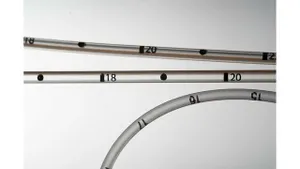Sabic, Sinopec adding 260kt of polycarbonate capacity in China
Guangzhou—The two plastics and chemicals suppliers, already joint venture partners in plants in China for polyethylene and polypropylene, announced yesterday at the Chinaplas trade show that they would build a new 260,000 tonne/yr polycarbonate plant, online in 2015.
May 18, 2011
The joint venture will produce Lexan-brand polycarbonate (PC): Lexan is the brand name under which Sabic Innovative Plastics, the former GE Plastics, markets its PC. "We're very bullish on the Chinese market," confirmed Charlie Crew, president and CEO of Sabic IP, in a meeting with PlasticsToday at the Chinaplas show.
Crew and Peter Chan, president of Greater China for Sabic IP, added that their company is eyeing sites in Northern and Western China to build new polypropylene compounding facilities to serve the country's automotive market, which last year produced some 18 million vehicles. Last year the company started a giant PP compounding facility in Belgium, and it has capacity in the U.S. too; adding one in China would give it capacity in the three major automotive manufacturing regions.
Crew said that so far he has not set a date for start of construction for the new compounding sites in China as his company continues seeking feedback from its customers to determine where it should be sited. The PP compounding plant would "most likely" source its PP from the Sinopec/Sabic joint venture, Sinopec Sabic Tianjin Petrochemical Co.
The polycarbonate plant will be built at the JV site in Tianjin.
In response to questions from PlasticsToday, Crew also said that Sabic continues to see a very bright future for PC glazing, and not just in automotive fenestration. Automotive remains the top target market but it of course requires substantial testing and research before OEMs will switch from the proven glass windows to higher (piece) cost but lower weight PC windows. "PC allows designs that glass can never do," he added, and claimed that the total systems cost for PC glazing is at a par with or below that of glass. But the supplier is not focusing all of its PC glazing research on automotive. Crew explained that the supplier foresees great potential for PC glazing applications in electronics/electrical devices such as touch pads, where thin PC films could score with designers and manufacturers.
Another PC market set for explosive growth is LED lighting, where Sabic IP also sees synergies with other resins in its portfolio such as Noryl PPE.
Sabic IP also announced at Chinaplas that it would be expanding its current PC compounding capacity at its lines in Shanghai, as ell as extrusion of PC films from its facility in Nansha, also China. The new compounding capacity in Shanghai is expected to be running by next year.
About the Author(s)
You May Also Like


